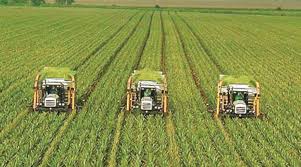
Embracing Agricultural Innovation
Pakistani farmers are increasingly adopting advanced agricultural technologies to boost crop yields and improve food security across the country. With the challenges of climate change, water scarcity, and a growing population, traditional farming methods have proven insufficient in meeting the demand for food. In response, farmers are turning to modern technologies such as precision farming, genetically modified (GM) crops, and smart irrigation systems. These innovations are helping farmers to optimize their productivity, conserve resources, and enhance the sustainability of their farming practices. By incorporating these technologies into their operations, farmers are improving both the quantity and quality of their crops, paving the way for a more prosperous and food-secure future.
Precision Farming and Data-Driven Decisions
One of the key advancements in modern agriculture in Pakistan is the use of precision farming techniques, which rely on data-driven decision-making to maximize crop yields. Using tools like satellite imaging, soil sensors, and drones, farmers can monitor soil health, crop growth, and weather patterns in real-time. This data allows them to make more informed decisions about irrigation, fertilization, and pest control. By applying the right amount of inputs at the right time, farmers can significantly increase their yields while reducing waste and environmental impact. Precision farming not only helps optimize crop production but also contributes to more sustainable and efficient farming practices, which are crucial for the country’s agricultural future.
Smart Irrigation Systems
Water scarcity is one of the most pressing challenges facing Pakistani agriculture, particularly in regions that rely heavily on irrigation. To combat this issue, farmers are increasingly adopting smart irrigation systems that use advanced technology to manage water usage more efficiently. These systems use sensors, weather forecasts, and data analytics to determine the precise amount of water needed for crops at any given time. As a result, farmers can reduce water wastage, conserve vital water resources, and ensure that crops receive the optimal amount of moisture. By embracing such water-saving technologies, Pakistani farmers are not only improving crop yields but also contributing to more sustainable water management practices, which is essential in the face of ongoing water stress in the region.
Adoption of Genetically Modified (GM) Crops
The adoption of genetically modified (GM) crops is another important step towards improving crop yields in Pakistan. GM crops are designed to be more resistant to pests, diseases, and environmental stresses such as drought. By incorporating these genetically engineered varieties, farmers can reduce their reliance on chemical pesticides and fertilizers, lower production costs, and increase crop resilience. Cotton, maize, and rice are among the crops in Pakistan that have seen the introduction of GM varieties. With higher yields and reduced vulnerability to environmental challenges, GM crops are becoming an essential tool for improving food security and enhancing agricultural productivity in the country.
Overcoming Challenges and Ensuring Access
While the adoption of advanced technologies is proving beneficial for many farmers in Pakistan, several challenges remain in ensuring widespread access and integration. The high initial cost of technology, lack of training, and limited access to digital infrastructure in rural areas can hinder the adoption of these innovations among small-scale farmers. To overcome these barriers, the government and private sector must collaborate to provide affordable solutions, training programs, and support systems to farmers. In addition, policies that incentivize the use of technology and facilitate the transfer of knowledge to rural communities will be key in ensuring that the benefits of these advancements are accessible to all farmers. As Pakistan continues to invest in agricultural innovation and infrastructure, the long-term success of these efforts will depend on ensuring that all farmers, regardless of size or location, can access and benefit from the tools that will help them thrive in an increasingly complex and demanding agricultural landscape.
Explore the best games to earn real cash today
